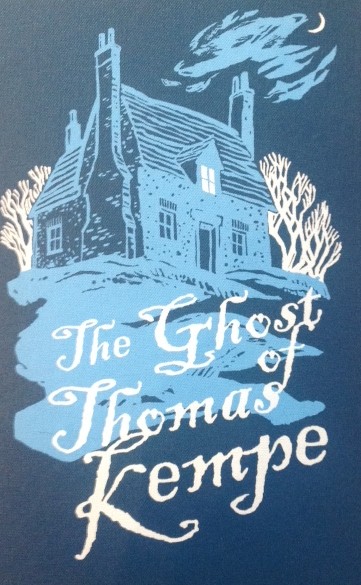Inspiring Young Readers
 posted on 14 Oct 2021
posted on 14 Oct 2021
The Ghost of Thomas Kempe by Penelope Lively
This children’s classic was written by Penelope Lively in 1973 and although it’s the best part of 50 years old it actually feels like it came from a long lost world. At a time when children’s literature seems to be dominated by authors who are addressing a range of important social issues, this one takes you back to a time when young children (boys in this case) were depicted as having very little to worry about except scrumping, digging tunnels in the garden and exploring the habits of beetles and other insects. Sam Jordison writing for The Guardian describes the book in this way:
“The Ghost Of Thomas Kempe is a glorious reminder of the fun of being a boy. It centres on James – a fun, clumsy, Just William kind of character who delights in just scruffing around with his almost-talkative dog Timmy. He makes a mess in the kitchen, digs tunnels in the garden and conducts "studies" on interesting insects. It is all delightful, and it all happens under golden sunshine, in a peaceful village, in a lovingly described cottage. Lively evokes bliss for her young hero – and just as brilliantly disrupts it.”
And the fact that James is a bit of a rogue is central to the story because when the ghost of Thomas Kempe begins to manifest himself in the family’s new home, everyone immediately ascribes the chaos to the antics of the young boy. And so the story becomes one that focuses on how James deals with the increasingly outrageous demands of this troublesome spirit.
The ghost is also a wonderful invention – demanding, anarchic and with an undercurrent of melancholy. This is a spirit that just can’t seem to let go of the world that’s done him wrong. Kempe, it turns out, lived in the cottage in the 17th century and announces himself in writing to James as "Thos. Kempe Esquire. Sorceror" . It seems that Kempe has decided that James will be his new apprentice and starts giving him orders and tasks to undertake which, if not completed to his satisfaction, results in the ghost hurling furniture and crockery or writing more and more inflammatory messages on walls and doors.
I’m clearly not going to tell you how the story develops and plays out because that will rob you of a significant part of the pleasure of reading the book but, as Jordison points out:
“This may be a book targeted at children, but it's still Penelope Lively. She never talks down to her younger readers, never assumes that they are less than intelligent. The result is a book more profound than most written for grown-ups. And also sadder.”
What Lively has done in a very clever sleight of hand is to lure us into this seemingly innocent world of childhood in which a boy can have adventures with a little but not too much jeopardy and smuggles in some little pin-pricks of reality that slowly let the air out of the fantasy.
This is already an idyllic rural village that’s changing:
"New housing estates were mushrooming now on two sides of it, but the centre remained as it must always have been with the houses and streets a size smaller than the houses and streets of a modern town. Lorries, and even the tops of cars, rode parallel with the upstairs windows of the terraced cottages."
And Jorison again puts his finger on a crucial part of the overall tone of the book (which I quote again because he captures this much better than I could):
“Thomas Kempe most obviously carries this kernel of a different age and of time working against him. The ghost is funny, but he is also, eventually, tragic. He is out of step, out of place, unable to cope with the changes that the passing years have wrought. And as we reflect on these vagaries, we also come to realise that James's childhood summer isn't all that long in the greater scheme of things. And so, this retreat into childhood brings a freight of melancholy. The past is a place you can never properly revisit. You always remember what you've lost as much as what you once had.”
But it’s not melancholy that you’re left with at the end of the book despite these intimations of change and mutability. The overwhelming experience is one of great fun and abandonment to the sheer pleasure of an immersive adventure story – one that can be enjoyed by older readers as well as a younger audience.
The copy I read was from the Folio Society and is a very handsome edition but much more expensive than the paperbacks that are readily available.
Terry Potter
October 2021